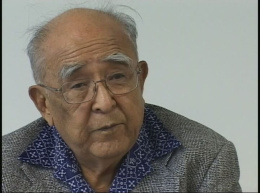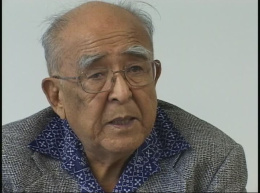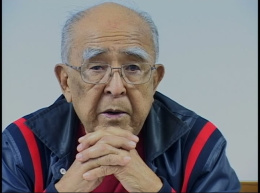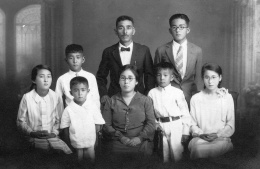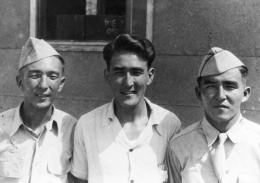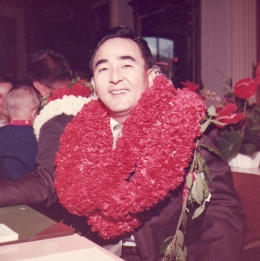Katsugo Miho
| Name | Katsugo Miho |
|---|---|
| Born | May 15 1922 |
| Died | September 11 2011 |
| Birth Location | Maui |
| Generational Identifier |
Lawyer, judge, Hawai'i state legislator and World War II veteran.
Early Life on Maui
Katsugo "Kats" Miho was born on May 15, 1922, on the island of Maui, the youngest of eight children of Issei parents Katsuichi and Ayano Miho. Like many of the Issei who had migrated to Hawai'i, the Mihos were from Hiroshima prefecture. Since Ayano's family had no male children, Katsuichi—whose birth family name was Imamura—became a mukoyōshi in taking her name upon marriage. A former school principal in Hiroshima, Katsuichi was recruited in 1910 to establish a Japanese school on Maui. Since Ayano was pregnant with her third child, Tsukie (Rosaline), she remained in Hiroshima while Katsuichi went ahead to establish residence in Honolulu in 1910. He worked odd jobs to earn enough money to pay for passage back to Japan a year later to retrieve his family. He and Ayano were able to bring their infant daughter Tsukie with them but were forced to leave their two eldest children, son Katsuto and daughter Hisae, with Ayano's parents as assurance of their return to run the family ajitsuke nori (roasted seasoned seaweed) business. In 1912, they moved to Maui where he became the principal of the Keāhua Japanese School and the head of the Wailuku Hongwanji Academy. A disagreement over the board's decision not to allow a student of Okinawan ancestry to deliver a speech welcoming a visiting Japanese ship, caused Katsuichi to leave the school. He subsequently worked at various jobs in Maui, O'ahu, and in California before becoming a bookkeeper for the Onishi Store in Kahului. The couple meanwhile had five more children after moving to Hawai'i. In 1929, the family purchased a fourteen room hotel which became the K. Miho Hotel, serving primarily Issei salesmen from Honolulu making sales trips to Maui. [1]
Young Katsugo attended Kahului Grammar School followed by Japanese language school for an hour every afternoon. He went on to Maui High School where he was active in student government and played football and other sports. He also worked from the time he was seven or eight, starting with delivering the local Japanese newspaper and helping out at the family hotel as a teenager—everything from housecleaning to shining shoes to heating water for the Japanese style baths. While in high school, he spent summers working on the sugar plantation. He nonetheless found the time to take part in Boy Scouts and myriad organized sports including baseball and softball, barefoot and high school football, basketball, and sumo. [2]
Like his siblings before him, it was expected that he would go to college after graduating high school in 1940. Also like his siblings, he worked for a year after high school to raise the money for college, in Kats's case, as a maintenance man at the Maui Pineapple cannery. He subsequently enrolled at the University of Hawai'i at Mānoa in the fall of 1941. [3]
World War II and Military Service
Miho was finishing up his first semester at the university when the Japanese attacked Pearl Harbor on the morning of December 7, 1941 . As member of the Reserve Officers' Training Corps (ROTC), he was inducted into the newly formed Hawaii Territorial Guard (HTG) later that morning. Issued rifles they hadn't yet learned how to fire, Miho and his largely Nisei colleagues were dispatched to stand guard at various sites around the island including high schools that had been converted to emergency hospitals and an electrical station. But after six weeks, on January 21, 1942, Nisei members of the HTG were suddenly dismissed, dealing a crushing blow to Miho and others. While some of the dismissed Nisei formed the Varsity Victory Volunteers , Miho decided to return home to Maui, where he worked as a carpenter at Pu'unēnē Naval Air Station for 75¢ an hour. In the meantime, his father, active in Japanese community organizations and a consular representative, had been arrested and interned, first at the Maui County Jail , then on Sand Island . Transferred to the continental U.S. in March 1942, he was interned for the duration of the war in camps at Angel Island , California; Fort Sill , Oklahoma; Camp Livingston , Louisiana; Fort Missoula , Montana; and Santa Fe , New Mexico. Katsugo's sister, Fumiye, had gone to Japan in 1940 after graduating from the University of Hawai'i and remained there living with older sister Tsukie and her family, unable to return to Hawai'i. [4]
With the formation of the 442nd Regimental Combat Team in February of 1943, Katsugo and his brother Katsuaki both enlisted, the latter despite having been accepted to medical school. With the rest of the Hawai'i volunteers, Katsugo sailed to the continental U.S. eventually at arriving at Camp Shelby, Mississippi, for basic training. Based on mechanical and mathematical aptitude tests, he was assigned to B Battery of the 522nd Field Artillery Battalion . He and his battery mates spent several months in training learning how to set and precisely target the guns, then applying those lessons under simulated conditions in the field. As a gunner corporal, Miho was in charge of the gun's deflection—its positioning along the horizontal axis—so as to hit the assigned target. While in training, tragedy struck when Katsuaki was killed in a truck accident on September 16. Along with another brother Paul, Katsuaki took a furlough to retrieve Katsuaki's ashes and to take them to his interned father in Missoula before sending them home to his mother. [5]
Shipped out with the rest of the 442nd in May 1944, Miho remained in Europe with the 522nd for the duration of the war and beyond providing precise artillery support for the 442nd infantry in Italy and France, including the Rescue of the Lost Battalion in October 1944. Mostly protected from direct fire, the 522nd suffered relatively few casualties. However, most artillerymen including Miho suffered permanent hearing loss from the repeated cannon fire. In March 1945, the 522nd was separated from the 442nd and sent to Germany for the rest of the war. In the midst of an intense period that saw them travel over six hundred miles in fifty-five days, firing some 15,000 rounds in support of the 3rd Army, Miho was among members of the 522nd who encountered German death camps that were part of the Dachau complex. "They were all skin and bones, really skin and bones, but they were alive and walking," he recalled years later about some of the survivors. "This is the horror of Dachau. They were as if there was no feeling, no emotion, no joy..." After VE Day, Miho and the 522nd did guard and occupation duty in rural areas in Germany. [6]
After the War
Miho returned to Hawai'i in January 1946 and was greeted by both parents, his father having already returned to Hawai'i after being released from internment. He returned to the University of Hawai'i almost immediately, though like many returning veterans, he found it difficult to concentrate on his studies initially. He was active on campus and eventually became president of the senior class. Following in the footsteps of his brother Katsuro , he went to law school at George Washington University in Washington, D.C., funded by his GI Bill benefits. While in D.C., he met or reunited with many others from Hawai'i who were studying there, including roommate John Ushijima, a future state senator and Daniel Inouye and his wife Margaret, with whom he dined almost weekly. Upon his graduation, he returned to Honolulu, passing the bar exam in 1953, and joined his brother's law firm, Fong, Miho, and Choy. In addition to big clients Finance Factors and Foodland, the firm also handled some Japanese American related cases including those of strandees (Nisei like Fumiye who had been caught in Japan during the war and who wanted to return to the U.S.) and of Japanese war brides. [7]
He first became involved in politics in 1954 when he served on Honolulu Mayor Johnny Wilson's reelection committee and subsequently helped out on other campaigns for candidates from both parties. He eventually decided to become a Republican due in part to feeling the Democratic Party had mistreated his brother Katsuro and that it would not be healthy if all of the Nisei veterans were Democrats. In 1958, he was recruited by Republican Mayor Neil Blaisdell to run as a city councilman as part of his slate. Though he lost that election, he won election to the Hawai'i House of Representatives in 1959 representing the 15th District (McCully, Makiki, Waikīkī) and was reelected four times, eventually becoming the house minority leader. He is perhaps best known for his sponsorship of 1961 Horizontal Property Regime legislation that essentially allowed owners of apartments to also own a share of the land their building sat on, allowing for the development of condominiums as we know them today. After losing his seat in 1970 when the district was split up, he was appointed by Governor George Ariyoshi to be a family court judge from 1971 to 1979. He subsequently became the legal counsel for Servco-Pacific. [8]
In 1956, Miho married Laura Iida, the daughter of prominent businessman Koichi Iida who had been interned with Katsuichi Miho during the war. The wedding linking two prominent Nikkei families had over 1,000 guests at Central Union Church in Honolulu. The couple eventually had four children. [9]
Following in the footsteps of his father, Miho was also active in various community endeavors. Recognizing the bond he felt towards his fellow veterans, he became one of the founders of the 442nd Veterans Club and later served two terms as its president. He also co-chaired the Japan Hawaii High School Goodwill and Friendship baseball series from 1957 to 1995 and chaired nine Japan Goodwill Sumo tournaments from 1962 to 1987 as sponsored by 442nd Veterans Club. His interest in sumo—something that stemmed from the popularity of sumo in Maui during his youth—led to his serving as an advisor to Maui's Jesse Kuhaulua (aka Takamiyama), a pioneering sumotori and stablemaster in Japan, and later to Chad Rowan (aka Akebono), the first yokozuna (grand champion) from somewhere other than Japan. He was honored by the Japanese government with the Order of the Rising Sun, Gold and Silver Rays in 2007. [10]
Katsugo Miho passed away on September 11, 2001 at the age of eighty-nine. [11]
For More Information
Brown, Daniel James. Facing the Mountain: A True Story of Japanese American Heroes in World War II . New York: Viking, 2021.
"Katsugo Miho, 522nd Field Artillery, 442nd RCT." The Hawai'i Nisei Story: Americans of Japanese Ancestry During World War II. University of Hawai'i, 2006–07.
Miho, Katsugo. Oral History Interview by Michi Kodama-Nishimoto and Warren Nishimoto, Nov. 16, 1989, Honolulu, Hawai'i . In Hawai'i Political History Documentation Project, Volume I . Honolulu: Center for Oral History, Social Science Research Institute, University of Hawai'i at Mānoa, June 1996. 347–76.
Footnotes
- ↑ Katsugo, Miho Oral History Interview by Michi Kodama-Nishimoto and Warren Nishimoto, Nov. 16, 1989, Honolulu, Hawai'i, in Hawai'i Political History Documentation Project, Volume I" (Honolulu: Center for Oral History, Social Science Research Institute, University of Hawai'i at Mānoa, June 1996), 348–49, 351; Katsugo Miho interview, The Hawai'i Nisei Story website, accessed on Feb. 3, 2021 at http://nisei.hawaii.edu/object/io_1206611416171.html and http://nisei.hawaii.edu/object/io_1206611924671.html ; Daniel James Brown, Facing the Mountain: A True Story of Japanese American Heroes in World War II (New York: Viking, 2021), 15–16, 47–49.
- ↑ Katsugo Miho interview, The Hawai'i Nisei Story website, accessed on Feb. 3, 2021 at http://nisei.hawaii.edu/object/io_1206611924671.html , http://nisei.hawaii.edu/object/io_1206612640265.html , and http://nisei.hawaii.edu/object/io_1206613059906.html ; Katsugo Miho Oral History, 350–56.
- ↑ Katsugo Miho interview, The Hawai'i Nisei Story website, accessed on Feb. 3, 2021 at http://nisei.hawaii.edu/object/io_1206613059906.html ; Katsugo Miho Oral History, 356.
- ↑ Katsugo Miho interview, The Hawai'i Nisei Story website, accessed on Feb. 3, 2021 at http://nisei.hawaii.edu/object/io_1206613555015.html , http://nisei.hawaii.edu/object/io_1206614061171.html , and http://nisei.hawaii.edu/object/io_1206614351937.html ; Katsugo Miho Oral History, 357–61; Brown, Facing the Mountain , 31–32, 37, 46, 49, 50–51, 70 87–89; 193–94, 296.
- ↑ Katsugo Miho interview, The Hawai'i Nisei Story website, accessed on Feb. 3, 2021 at http://nisei.hawaii.edu/object/io_1206614351937.html , http://nisei.hawaii.edu/object/io_1206614829875.html and http://nisei.hawaii.edu/object/io_1206615103421.html ; Brown, Facing the Mountain , 167, 191–92, 193–96.
- ↑ Katsugo Miho interview, The Hawai'i Nisei Story website, accessed on Feb. 3, 2021 at http://nisei.hawaii.edu/object/io_1206615329203.html , http://nisei.hawaii.edu/object/io_1206615608906.html , http://nisei.hawaii.edu/object/io_1206615799812.html , http://nisei.hawaii.edu/object/io_1206616100625.html , and http://nisei.hawaii.edu/object/io_1206616264781.html ; Brown, Facing the Mountain , 261, 395, 433; Wayne Muromoto, "The 522nd and Dachau," The Hawai'i Herald , Mar. 19, 1993, A24; Linda K. Menton, "Research Report: Nisei Soldiers at Dachau, Spring 1945" Holocaust and Genocide Studies 28.2 (Fall 1994), 263.
- ↑ Katsugo Miho interview, The Hawai'i Nisei Story website, accessed on Feb. 3, 2021 at http://nisei.hawaii.edu/object/io_1206616264781.html , http://nisei.hawaii.edu/object/io_1206616525906.html , http://nisei.hawaii.edu/object/io_1206616782390.html , and http://nisei.hawaii.edu/object/io_1206616970218.html ; Katsugo Miho Oral History, 364–67.
- ↑ Katsugo Miho interview, The Hawai'i Nisei Story website, accessed on Feb. 3, 2021 at http://nisei.hawaii.edu/object/io_1206617112546.html ; Katsugo Miho Oral History, 368–75.
- ↑ Brown, Facing the Mountain , 469–72; Katsugo Miho interview, The Hawai'i Nisei Story website, accessed on Feb. 3, 2021 at http://nisei.hawaii.edu/object/io_1206616970218.html .
- ↑ Katsugo Miho interview, The Hawai'i Nisei Story website, accessed on Feb. 3, 2021 at http://nisei.hawaii.edu/object/io_1206616525906.html ; Steve Lum, "Akebono's Rise to the Top," The Hawai'i Herald , Feb. 12, 1993, B10–11; The Hawai'i Herald , Feb. 2, 2001, A3 and June 1, 2007, 3.
- ↑ Katsugo Miho obituary, Honolulu Star-Advertiser, Sept. 25, 2011, accessed on Feb. 4, 2021 at https://obits.staradvertiser.com/2011/09/25/katsugo-miho/ .
Last updated April 17, 2024, 4:47 a.m..

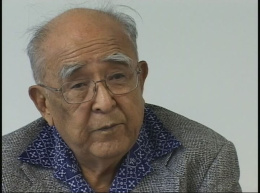 Media
Media
